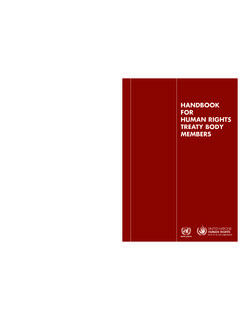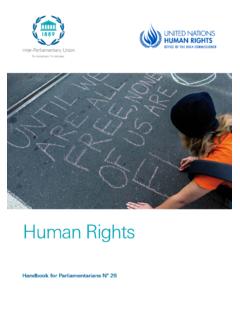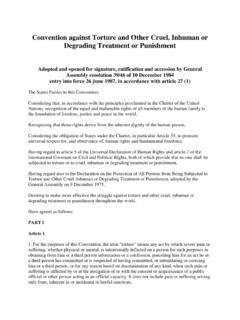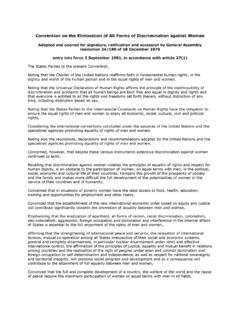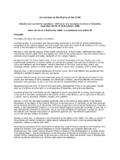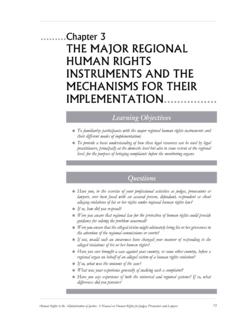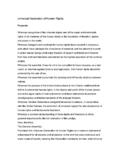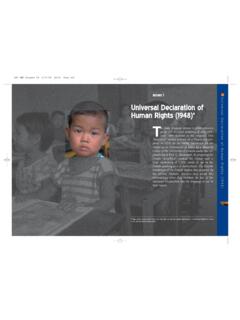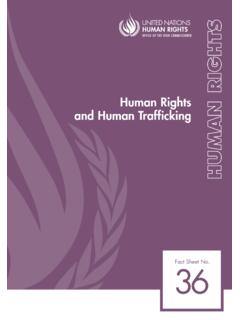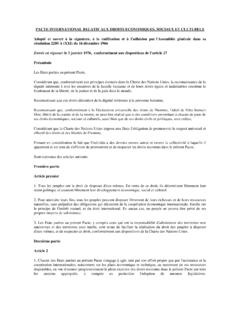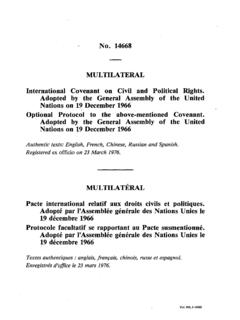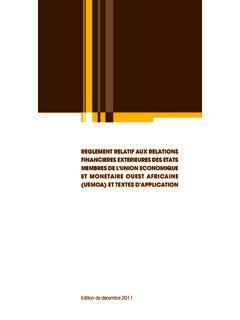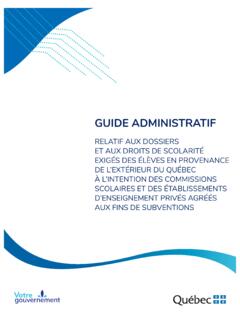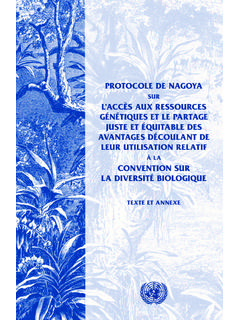Transcription of International Covenant on Economic, Social and Cultural …
1 International Covenant on economic , Social and Cultural Rights Adopted and opened for signature, ratification and accession by General Assembly resolution 2200A (XXI) of 16 December 1966 entry into force 3 January 1976, in accordance with article 27 Preamble The States Parties to the present Covenant , Considering that, in accordance with the principles proclaimed in the Charter of the United Nations, recognition of the inherent dignity and of the equal and inalienable rights of all members of the human family is the foundation of freedom, justice and peace in the world, Recognizing that these rights derive from the inherent dignity of the human person, Recognizing that, in accordance with the Universal Declaration of Human Rights, the ideal of free human beings enjoying freedom from fear and want can only be achieved if conditions are created whereby everyone may enjoy his economic , Social and Cultural rights, as well as his civil and political rights.
2 Considering the obligation of States under the Charter of the United Nations to promote universal respect for, and observance of, human rights and freedoms, Realizing that the individual, having duties to other individuals and to the community to which he belongs, is under a responsibility to strive for the promotion and observance of the rights recognized in the present Covenant , Agree upon the following articles: PART I Article 1 1. All peoples have the right of self-determination. By virtue of that right they freely determine their political status and freely pursue their economic , Social and Cultural development. 2. All peoples may, for their own ends, freely dispose of their natural wealth and resources without prejudice to any obligations arising out of International economic co-operation, based upon the principle of mutual benefit, and International law.
3 In no case may a people be deprived of its own means of subsistence. 3. The States Parties to the present Covenant , including those having responsibility for the administration of Non-Self-Governing and Trust Territories, shall promote the realization of the right of self-determination, and shall respect that right, in conformity with the provisions of the Charter of the United Nations. PART II Article 2 21. Each State Party to the present Covenant undertakes to take steps, individually and through International assistance and co-operation, especially economic and technical, to the maximum of its available resources, with a view to achieving progressively the full realization of the rights recognized in the present Covenant by all appropriate means, including particularly the adoption of legislative measures. 2. The States Parties to the present Covenant undertake to guarantee that the rights enunciated in the present Covenant will be exercised without discrimination of any kind as to race, colour, sex, language, religion, political or other opinion, national or Social origin, property, birth or other status.
4 3. Developing countries, with due regard to human rights and their national economy, may determine to what extent they would guarantee the economic rights recognized in the present Covenant to non-nationals. Article 3 The States Parties to the present Covenant undertake to ensure the equal right of men and women to the enjoyment of all economic , Social and Cultural rights set forth in the present Covenant . Article 4 The States Parties to the present Covenant recognize that, in the enjoyment of those rights provided by the State in conformity with the present Covenant , the State may subject such rights only to such limitations as are determined by law only in so far as this may be compatible with the nature of these rights and solely for the purpose of promoting the general welfare in a democratic society. Article 5 1.
5 Nothing in the present Covenant may be interpreted as implying for any State, group or person any right to engage in any activity or to perform any act aimed at the destruction of any of the rights or freedoms recognized herein, or at their limitation to a greater extent than is provided for in the present Covenant . 2. No restriction upon or derogation from any of the fundamental human rights recognized or existing in any country in virtue of law, conventions, regulations or custom shall be admitted on the pretext that the present Covenant does not recognize such rights or that it recognizes them to a lesser extent. PART III Article 6 1. The States Parties to the present Covenant recognize the right to work, which includes the right of everyone to the opportunity to gain his living by work which he freely chooses or accepts, and will take appropriate steps to safeguard this right.
6 2. The steps to be taken by a State Party to the present Covenant to achieve the full realization of this right shall include technical and vocational guidance and training programmes, policies and techniques to achieve steady economic , Social and Cultural development and full and productive employment under conditions safeguarding fundamental political and economic freedoms to the individual. Article 7 The States Parties to the present Covenant recognize the right of everyone to the enjoyment of just and favourable conditions of work which ensure, in particular: (a) Remuneration which provides all workers, as a minimum, with: 3(i) Fair wages and equal remuneration for work of equal value without distinction of any kind, in particular women being guaranteed conditions of work not inferior to those enjoyed by men, with equal pay for equal work; (ii) A decent living for themselves and their families in accordance with the provisions of the present Covenant ; (b) Safe and healthy working conditions; (c) Equal opportunity for everyone to be promoted in his employment to an appropriate higher level, subject to no considerations other than those of seniority and competence.
7 (d ) Rest, leisure and reasonable limitation of working hours and periodic holidays with pay, as well as remuneration for public holidays Article 8 1. The States Parties to the present Covenant undertake to ensure: (a) The right of everyone to form trade unions and join the trade union of his choice, subject only to the rules of the organization concerned, for the promotion and protection of his economic and Social interests. No restrictions may be placed on the exercise of this right other than those prescribed by law and which are necessary in a democratic society in the interests of national security or public order or for the protection of the rights and freedoms of others; (b) The right of trade unions to establish national federations or confederations and the right of the latter to form or join International trade-union organizations; (c) The right of trade unions to function freely subject to no limitations other than those prescribed by law and which are necessary in a democratic society in the interests of national security or public order or for the protection of the rights and freedoms of others; (d) The right to strike, provided that it is exercised in conformity with the laws of the particular country.
8 2. This article shall not prevent the imposition of lawful restrictions on the exercise of these rights by members of the armed forces or of the police or of the administration of the State. 3. Nothing in this article shall authorize States Parties to the International Labour Organisation Convention of 1948 concerning Freedom of Association and Protection of the Right to Organize to take legislative measures which would prejudice, or apply the law in such a manner as would prejudice, the guarantees provided for in that Convention. Article 9 The States Parties to the present Covenant recognize the right of everyone to Social security, including Social insurance. Article 10 The States Parties to the present Covenant recognize that: 1. The widest possible protection and assistance should be accorded to the family, which is the natural and fundamental group unit of society, particularly for its establishment and while it is responsible for the care and education of dependent children.
9 Marriage must be entered into with the free consent of the intending spouses. 2. Special protection should be accorded to mothers during a reasonable period before and after childbirth. During such period working mothers should be accorded paid leave or leave with adequate Social security benefits. 43. Special measures of protection and assistance should be taken on behalf of all children and young persons without any discrimination for reasons of parentage or other conditions. Children and young persons should be protected from economic and Social exploitation. Their employment in work harmful to their morals or health or dangerous to life or likely to hamper their normal development should be punishable by law. States should also set age limits below which the paid employment of child labour should be prohibited and punishable by law.
10 Article 11 1. The States Parties to the present Covenant recognize the right of everyone to an adequate standard of living for himself and his family, including adequate food, clothing and housing, and to the continuous improvement of living conditions. The States Parties will take appropriate steps to ensure the realization of this right, recognizing to this effect the essential importance of International co-operation based on free consent. 2. The States Parties to the present Covenant , recognizing the fundamental right of everyone to be free from hunger, shall take, individually and through International co-operation, the measures, including specific programmes, which are needed: (a) To improve methods of production, conservation and distribution of food by making full use of technical and scientific knowledge, by disseminating knowledge of the principles of nutrition and by developing or reforming agrarian systems in such a way as to achieve the most efficient development and utilization of natural resources; (b) Taking into account the problems of both food-importing and food-exporting countries, to ensure an equitable distribution of world food supplies in relation to need.
